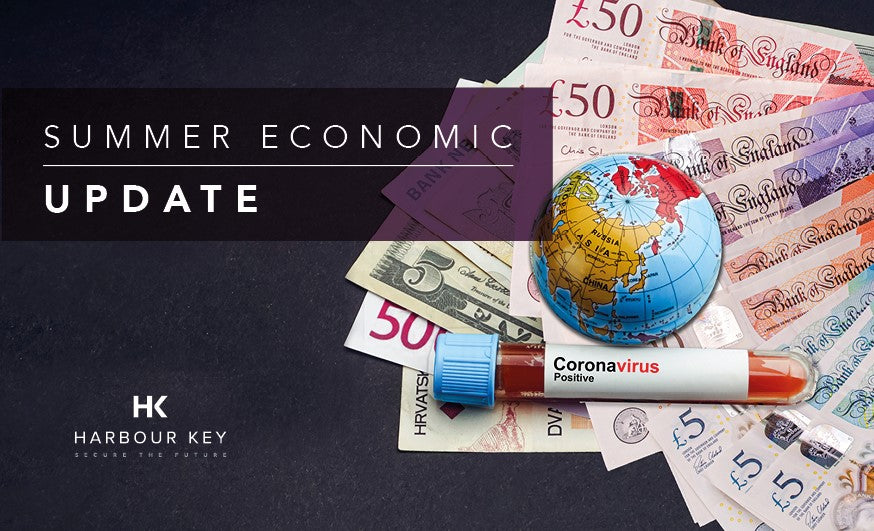
Chancellor Rishi Sunak delivered his well-publicised summer statement, outlining his ambitions for the recovery from the economic harm caused by the Covid-19 pandemic.
The Chancellor focussed entirely on his immediate objectives, calling this the second phase of the Government’s economic response its “Plan for Jobs”. The plan has three key objectives:
To support jobs
To create jobs
To protect jobs
There were no big announcements on tax rises, as expected. The Chancellor remains committed to re-starting the economy and supporting businesses and individuals through continued uncertain times. Subject to any change of heart between now and the end of October, The Chancellor firmly closed the door on the Job Retention Scheme (aka furlough scheme), which will create a difficult situation for some of the hardest hit sectors and will leave many businesses with difficult decisions ahead of them.
Job support & retention – measures to support employers
Job Retention Bonus
A £1,000 bonus payment per employee to employers who bring employees back from furloughed leave and continue to employ them to 31 January 2021. The bonus will be a one-off payment, designed to encourage UK employers to retain their employees rather than make redundancies. To qualify, the employee must be paid on average at least £520 per month between the end of the Job Retention Scheme (31 October 2020) and the end of January 2021. The payments will be made from February 2021.
The grant is payable to the employer, and not a bonus payable to the employees returning to work.
Details of whether the payments are to be automatic or need to be applied for and more detail of the qualification criteria will follow at the end of July. However it appears the bonus will apply for any employee who has been furloughed at any time (say for only three weeks), provided they remain employed in January 2021.
Kickstart Scheme
A £2bn fund to create thousands of high-quality, six-month work placements for 16-24-year olds, who are receiving Universal Credit and are deemed to be at risk of long-term unemployment. The funding will cover 100% of the relevant National Minimum Wage for 25 hours a week, plus the associated employer National Insurance Contributions and automatic enrolment pension contributions. The hope is that the scheme will lead to long-term employment.
Trainee funding
Additional funding for traineeships in England, to support high quality work placements and training for 16-24-year olds. Employers providing trainees with work experience will receive £1,000 per trainee. A traineeship is an unpaid position for 16-24-year olds who have little or no work experience. The traineeships last up to six months and are designed to equip the trainee with the experience they need for an apprenticeship.
Apprenticeships
The Government are introducing a new payment of £2,000 to employers in England for each new apprentice they hire under the age of 25, and £1,500 for each new apprentice over the age of 25, hired between 1 August 2020 and 31 January 2021. This payment is in addition to the existing £1,000 payment the Government already provides for new 16-18-year-old apprentices.
It is expected that all of the above will be taxable payments, as was the case with the Coronavirus Job Retention Scheme grants.
Job Protection
Supporting the housing market through Stamp Duty cuts
To support the housing market, Stamp Duty has been reduced to 0% for purchases of dwellings up to £500,000 with immediate effect until 31 March 2021. Purchases of second homes/buy to lets by individuals and purchases of dwellings by companies will continue to suffer Stamp Duty at 3% surcharge up to £500,000.
The maximum saving is £15,000 per dwelling purchase. This applies where the sale contract is ‘substantially performed’ or completed before 1 April 2021, but after 8 July 2020.
Provide a VAT reduction lifeline to the tourism and leisure sector
To stimulate the tourism and leisure sector, a cut in VAT from 20% to 5% from 15 July 2020 to 12 January 2021. The reduced rate of VAT will apply to supplies of food and non-alcoholic drinks from restaurants, pubs, bars, cafés and similar premises across the UK. The temporary VAT cut will also apply to hotels, guest houses and similar accommodation as well as admission to attractions such as cinemas, theatres, zoos and theme parks.
The objective of the VAT cut would appear to be to encourage more individual consumers back to the restaurants and bars, but it depends on whether the consumer or the business will be the beneficiary of the cut. The consumer benefit relies on the businesses to pass on the cost reduction to the consumers. A small VAT saving is unlikely to have a huge impact for a customer, but for a business a large number of customer savings could add up to pounds and help plug the losses made during lockdown.
Further guidance on the scope of this VAT cut will be published by HM Revenue & Customs (HMRC) in the coming days.
Incentivise consumers to return to bars and restaurants
The introduction of the “Eat Out to Help Out” scheme, to encourage consumers back to the bars and restaurants. This scheme will entitle every diner to a 50% discount on their meal, up to £10 per head (including children), at any participating restaurant, café, pub or food service establishment. The participating establishments will be reimbursed fully for the discount applied.
The discount can be used an unlimited amount of times, but it is only available Monday to Wednesday during August. It applies to any eat-in meal and includes non-alcoholic drinks.
Other measures
- Green investment worth £3bn aimed at creating jobs and being more energy efficient;
- Support for Job Centres with over 13,500 mentors being recruited over the next few months.
Rishi Sunak confirmed there would be a budget and spending review in the autumn. At that time, the Chancellor will have more hard information and insight into progress on the economic recovery, so will be better placed to plan in relation to more stimuli and any tax changes.
As we know, for any debt there are two aspects: servicing it and repaying it. The current low interest rates should mean that servicing the debt is not a problem, however in respect of the capital repayment:
- Higher taxes v Reducing Government spending.
Any tax rises need to be very carefully considered to ensure that they do not negatively impact the recovery. Income Tax, VAT and National Insurance all raise considerable amounts of revenue, but an increase in any of them would almost certainly have a negative effect on individuals’ propensity to spend – while the Chancellor is looking to encourage more spending. A Corporation Tax increase also looks unlikely, as it is important (especially post-Brexit) that the UK remains an attractive place in which to set up and run a business.
So where could the tax increases or loss of tax reliefs fall? The following are some potential “front runners”:
- Pension tax relief – raised every Budget and has been reviewed on many occasions, but never gets abolished;
- State Pension triple lock, which guarantees the increase in state pensions is determined by reference to the highest of: national average earnings, CPI inflation or 2.5%;
- Increase in the 20% Capital Gains Rate on gains from non-residential property;
- Is now the time for a wealth tax, which has raised its head again, but the matter was raised before the Summer Statement in PM Questions, with Mr Johnson looking keen.
We will have to wait and see what comes out later in the year, but for now the Government continues to help support the re-opening of the UK economy with a “VAT cut, Stamp duty cut, Meals out cut.”



